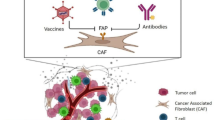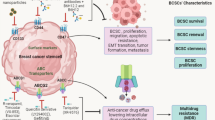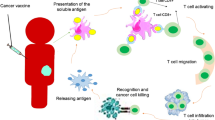Abstract
Background
Although targeted treatments against human epidermal growth factor receptor 2 (HER2) have improved survival in patients with metastatic HER2-positive breast cancer, long and repeated treatment is time-consuming and costly for patients. To reduce these burdens, we developed ex vivo gene-transduced adipocytes that secrete anti-HER2 antibodies and evaluated their anti-tumor effects.
Methods
Ceiling culture-derived proliferative adipocytes (ccdPA) secreting anti-HER2 antibody against domain IV receptors: TRA-ccdPA, and domain II receptors: PER-ccdPA, were constructed using a plasmid lentivirus. Delivery of secreted antibody and its specific binding to HER2 breast cancer were evaluated in vitro and in vivo. To optimize antibody production from ccdPA, different conditions of ccdPA implantation were examined. Anti-tumor efficacy was evaluated in HER2-positive-cancer-inoculated nude mice.
Results
Anti-HER2 antibody against domain II was identified in supernatants from PER-ccdPAs. The optimal method to achieve the highest concentration of antibody in mouse sera was injecting differentiated ccdPA cells into the mammary fat pad. Antibody in supernatants from PER-ccdPAs bound to the surface of HER2-positive breast cancer cells similar to pertuzumab. Antibodies in mouse sera were delivered to HER2-positive breast cancer tumors and tumor necrosis was observed microscopically. One-time administration of combined TRA-ccdPAs and PER-ccdPAs produced antibody continuously in mouse sera, and anti-tumor effects were maintained for the duration of this study in xenograft models. Furthermore, combination therapy significantly suppressed tumor growth compared with a single administration.
Conclusion
Ex vivo gene-transduced adipocytes might be useful for cell-based gene therapy. This system may be a platform for various antibody therapies.






Similar content being viewed by others
Data availability
Not applicable.
References
Peto R, Davies C, Godwin J, Gray R, Pan HC, Clarke M, et al. Comparisons between different polychemotherapy regimens for early breast cancer: meta-analyses of long-term outcome among 100,000 women in 123 randomised trials. Lancet. 2012;379(9814):432–44.
Anan K, Mitsuyama S, Koga K, Tanabe R, Saimura M, Tanabe Y, et al. Disparities in the survival improvement of recurrent breast cancer. Breast Cancer. 2010;17(1):48–55.
Giordano SH, Buzdar AU, Smith TL, Kau SW, Yang Y, Hortobagyi GN. Is breast cancer survival improving? Cancer. 2004;100(1):44–52.
Cameron D, Piccart-Gebhart MJ, Gelber RD, Procter M, Goldhirsch A, de Azambuja E, et al. Herceptin adjuvant trial study T, 11 years’ follow-up of trastuzumab after adjuvant chemotherapy in HER2-positive early breast cancer: final analysis of the HERceptin adjuvant (HERA) trial. Lancet. 2017;389(10075):1195–205.
Gianni L, Eiermann W, Semiglazov V, Lluch A, Tjulandin S, Zambetti M, et al. Neoadjuvant and adjuvant trastuzumab in patients with HER2-positive locally advanced breast cancer (NOAH): follow up of a randomised controlled superiority trial with a parallel HER2-negative cohort. Lancet Oncol. 2014;15(6):640–7.
Dawood S, Broglio K, Buzdar AU, Hortobagyi GN, Giordano SH. Prognosis of women with metastatic breast cancer by HER2 status and trastuzumab treatment: an institutional based review. J Clin Oncol. 2010;28(1):92–8.
Witzel I, Müller V, Abenhardt W, Kaufmann M, Schoenegg W, Schneeweis A, et al. Long-term tumor remission under trastuzumab treatment for HER2 positive metastatic breast cancer – results from the HER-OS patient registry. BMC Cancer. 2014;14:806.
Masuda T, Fujimoto H, Teranaka R, Kuroda M, Aoyagi Y, Nagashima T, et al. Anti-HER2 antibody therapy using gene-transduced adipocytes for HER2-positive breast cancer. Breast Cancer Res Treat. 2020;180(3):625–34.
Richard S, Selle F, Lotz JP, Khalil A, Gligorov J, Soares D. Pertuzumab and trastuzumab: the rationale way to synergy. An Acad Bras Cienc. 2016;88(1):565–77.
Swain SM, Kim SB, Cortés J, Ro J, Semiglazov V, Campone M, et al. Pertuzumab, trastuzumab, and docetaxel for HER2-positive metastatic breast cancer (CLEOPATRA study): overall survival results from a randomised, double-blind, placebo-controlled, phase 3 study. Lancet Oncol. 2013;14(6):461–71.
Gianni L, Pienkowski T, Im YH, Roman L, Tseng LM, Liu MC, et al. Efficacy and safety of neoadjuvant pertuzumab and trastuzumab in women with locally advanced, inflammatory, or early HER2-positive breast cancer (NeoSphere): a randomised multicentre, open-label, phase 2 trial. Lancet Oncol. 2012;13(1):25–32.
Kurebayashi J, Otsuki T, Tang CK, Kurosumi M, Yamamoto S, Tanaka K, et al. Isolation and characterization of a new human breast cancer cell line, KPL-4, expressing the Erb B family receptors and interleukin-6. Br J Cancer. 1999;79(5–6):707–17.
Kuroda M, Aoyagi Y, Asada S, Bujo H, Tanaka S, Konno S, et al. Ceiling culture-derived proliferative adipocytes are a possible delivery vehicle for enzyme replacement therapy in lecithin: cholesterol acyltransferase deficiency. Open Gene Ther J. 2011;4:1–10.
Scheuer W, Friess T, Burtscher H, Bossenmaier B, Endl J, Hasmann M. Strongly enhanced antitumor activity of trastuzumab and pertuzumab combination treatment on her2-positive human xenograft tumor models. Cancer Res. 2009. https://doi.org/10.1158/0008-5472.CAN-08-4597.
Kumar S, Markusic D, Biswas M, High K, Herzog R. Clinical development of gene therapy: results and lessons from recent successes. Mol Ther Methods Clin Dev. 2016;25(3):16034.
Sun W, Shi Q, Zhang H, Yang K, Ke Y, Wang Y, et al. Advances in the techniques and methodologies of cancer gene therapy. Discover Med. 2019;27(146):45–55.
Maude S, Laetsch T, Buechner J, Rives S, Boyer M, Bittencourt H, et al. Tisagenlecleucel in children and young adults with b-cell lymphoblastic leukemia. N Engl J Med. 2018;378(5):439–48.
Park J, Rivière I, Gonen M, Wang X, Sénéchal B, Curran K, et al. Long-term follow-up of CD19 CAR therapy in acute lymphoblastic leukemia. N Engl J Med. 2018;378(5):449–59.
Wirth T, Ylä-Herttuala S. Gene therapy used in cancer treatment. Biomedicines. 2014;2(2):149–62.
Jiang M, Shi W, Zhang Q, Wang X, Guo M, Cui Z, et al. Gene therapy using adenovirus-mediated full-length anti-HER-2 antibody for HER-2 overexpression cancers. Clin Cancer Res. 2006;12(20 Pt 1):6179–85.
Kim H, Danishmalik S, Hwang H, Sin JI, Oh J, Cho Y, et al. Gene therapy using plasmid DNA-encoded anti-HER2 antibody for cancers that overexpress HER2. Cancer Gene Ther. 2016;23(10):341–7.
Kanojia D, Balyasnikova I, Morshed R, Frank R, Yu D, Zhang L, et al. Neural stem cells secreting anti-HER2 antibody improve survival in a preclinical model of HER2 overexpressing breast cancer brain metastases. Stem Cells. 2015;33(10):2985–94.
Zafir-Lavie I, Sherbo S, Goltsman H, Badinter F, Yeini E, Ofek P, et al. Successful intracranial delivery of trastuzumab by gene-therapy for treatment of HER2-positive breast cancer brain metastases. J Control Release. 2018;10(291):80–9.
Spalding K, Arner E, Westermark P, Bernard S, Buchholz B, Bergmann O, et al. Dynamics of fat cell turnover in humans. Nature. 2008;453(7196):783–7.
Kronowitz S, Mandujano C, Liu J, Kuerer H, Smith B, Garvey P, et al. Lipofilling of the breast does not increase the risk of recurrence of breast cancer: a matched controlled study. Plast Reconstr Surg. 2016;137(2):385–93.
Wazir U, Chehade H, Headon H, Oteifa M, Kasem A, Mokbel K. Oncological safety of lipofilling in patients with breast cancer: a meta-analysis and update on clinical practice. Anticancer Res. 2016;36(9):4521–8.
Aoyagi Y, Kuroda M, Asada S, Tanaka S, Konno S, Tanio M, et al. Fibrin glue is a candidate scaffold for long-term therapeutic protein expression in spontaneously differentiated adipocytes in vitro. Exp Cell Res. 2012;318(1):8–15.
Rita Nahta R, Hung MC, Esteva FJ. The HER-2-targeting antibodies trastuzumab and pertuzumab synergistically inhibit the survival of breast cancer cells. Cancer Res. 2004;64(7):2343–6.
Tokuda Y, Ohnishi Y, Shimamura K, Iwasawa M, Yoshimura M, Ueyama Y, et al. In vitro and in vivo anti-tumour effects of a humanised monoclonal antibody against c-erbB-2 product. Br J Cancer. 1996;73(11):1362–5.
Luo Y, Li W, Jiang Z, Zhang Q, Wang L, Mao Y, et al. Pharmacokinetics of pertuzumab administered concurrently with trastuzumab in Chinese patients with HER2-positive early breast cancer. Anticancer Drugs. 2019;30(8):866–72.
Ito M, Bujo H, Takahashi K, Arai T, Tanaka I, Saito Y. Implantation of primary cultured adipocytes that secrete insulin modifies blood glucose levels in diabetic mice. Diabetologia. 2005;48(8):1614–20.
Aso M, Yamamoto T, Kuroda M, Wada J, Kubota Y, Ishikawa K, et al. First-in-human autologous implantation of genetically modified adipocytes expressing LCAT for the treatment of familial LCAT deficiency. Heliyon. 2022. https://doi.org/10.1016/j.heliyon.2022.e11271.
Muñoz M, Argüelles S, Guzman-Chozas M, Guillén-Sanz R, Franco J, Pintor-Toro J, et al. Cell tracking, survival, and differentiation capacity of adipose-derived stem cells after engraftment in rat tissue. J Cell Physiol. 2018;233(10):6317–28.
Acknowledgements
We thank CellGenTech Inc. for their support of this work. We thank Edanz Group (https://en-author-services.edanz.com/ac) for editing a draft of this manuscript. We thank Professor J. Kurebayashi for providing KPL-4.
Funding
This work was supported by MEXT KAKENHI Grant Number JP 18K08588 (H.F.).
Author information
Authors and Affiliations
Corresponding author
Ethics declarations
Conflict of interest
The authors declare that they have no conflict of interests.
Additional information
Publisher's Note
Springer Nature remains neutral with regard to jurisdictional claims in published maps and institutional affiliations.
About this article
Cite this article
Teranaka, R., Fujimoto, H., Masuda, T. et al. Ex vivo dual gene therapy using human adipocytes secreting anti-HER2 antibody on HER2-positive xenograft tumor models. Breast Cancer 30, 1018–1027 (2023). https://doi.org/10.1007/s12282-023-01497-8
Received:
Accepted:
Published:
Issue Date:
DOI: https://doi.org/10.1007/s12282-023-01497-8




